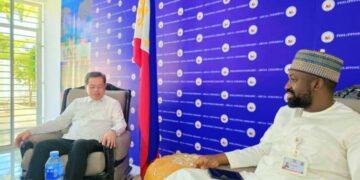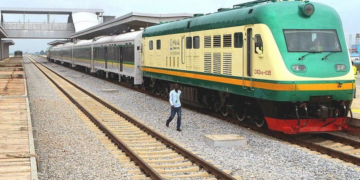More Nigerians have slipped under the poverty line going by the latest figures from the National Bureau of Statistics (NBS).
According to the government’s statistics agency, over three out of every five Nigerians are poor.
The NBS, in its latest National Multidimensional Poverty Index Report, released in Abuja, yesterday, said 133 million Nigerians are multidimensionally poor.
Multidimensional poverty encompasses deprivations experienced by poor people such as poor health, lack of education, inadequate living standards, and living in environmentally hazardous areas, among others, according to Oxford Poverty and Human Development Initiative.
According to the report, 63 per cent of Nigerians are poor due to a lack of access to health, education, and poor living standards, alongside unemployment and shocks.
The report also shows that over 50 per cent of Nigerians cook with dung, wood or charcoal, rather than cleaner energy, with most of them living in the Northern part of the country and in rural areas.
The study, which was done in collaboration with the National Social Safety-Nets Coordinating Office (NASSCO), the United Nations Development Programme (UNDP), the United Nations Children’s Fund (UNICEF), and the Oxford Poverty and Human Development Initiative (OPHI), had sampled over 56,000 households across the 36 states of the Federation and the FCT.
Conducted between November 2021 and February 2022, the study also provides data on multidimensional poverty estimates at senatorial district level. The National MPI is 0.257, indicating that poor people in Nigeria experience just over one-quarter of all possible deprivations.
According to the survey, 63 per cent, about 133 million persons of the Nigerian population are multidimensionally poor. Data further showed that 86 million of this people, representing 65 per cent of the multidimensionally poor, live in the north while 35 per cent, nearly 47 million, live in the South.
The survey showed that poverty levels across states vary significantly, with the incidence of multidimensional poverty ranging from a low of 27 per cent in Ondo to a high of 91 per cent in Sokoto.
“Over half of the population of Nigeria are multidimensionally poor and cook with dung, wood or charcoal, rather than cleaner energy. High deprivations are also apparent nationally in sanitation, time to healthcare, food insecurity, and housing.
“In general, the incidence of monetary poverty is lower than the incidence of multidimensional poverty across most states. In Nigeria, 40.1 per cent of people are poor according to the 2018/19 national monetary poverty line, and 63 per cent are multidimensionally poor according to the National MPI 2022.
“Multidimensional poverty is higher in rural areas, where 72 per cent of people are poor, compared to 42 per cent of people in urban areas.” The report stated.
The National MPI is reported with a linked Child MPI, which provides additional information on Multidimensional Child Poverty in Nigeria. The report showed that 67.5 per cent of children between the ages of zero and 17 years are multidimensionally poor, according to the National MPI, and half, around 51 per cent of all poor people, are children.
“The highest deprivations are in the indicator of child engagements – where over half of poor children lack the intellectual stimulation that is pivotal to early childhood development. Child poverty is prevalent in rural areas, with almost 90 per cent of rural children experiencing poverty.
“Across the geo-political zones, the child MPI shows higher poverty in the North-East and North-West, where 90 per cent of children are poor, and lower poverty in the South-East and South-West, which had 74 and 65.1 per cents respectively.
NBS Report Portends Threat To Nigeria’s Security, Stability – PDP Campaign
Meanwhile the Atiku/Okowa presidential campaign council yesterday said the recent report of the Nigerian Bureau of Statistics confirms that All Progressives Congress (APC) has a legacy of spreading poverty.
It also added that the development portends a threat to the security and stability of the Nigerian nation.
Special assistant, Public Communication, to Atiku Abubakar, Phrank Shaibu, said series of data by governmental and nongovernmental organisations underlined the fact that the number of Nigerians living in poverty is alarmingly high.
He however added that this latest report by the National Bureau of Statistics about the multidimensional height of poverty level calls for concern, more so that in Buhari’s Nigeria, there have been no convincing measures being taken to indicate that anything concrete is being done about it.
He expressed worry that over 23 million youths, mostly educated and potentially productive, are unemployed.
“This development portends only one thing: a threat to the security and stability of the Nigerian nation.”
He added that to worsen matters, the social safety net scheme introduced by the federal government in 2016 to tackle poverty and hunger has not made any significant impact owing to poor implementation, corruption allegation and politicization.
He said only a sensible government will reckon that by redirecting public expenditure away from recurrent expenses and unnecessary consumption back to capital projects, the government can have positive impact on incomes and employment. Such newly-employed individuals can in turn pay their bills, rent and essentials, thus providing income to the farmers, herdsmen, landlords and the like.
“Industrial policy, the kind that is encapsulated in Alhaji Atiku Abubakar’s blueprint, is another area to concentrate on. A nation of 200 million people cannot abandon its manufacturing sector in favour of importation. We must ensure that most of what we eat, drink, wear or otherwise use on daily basis are locally produced, thereby creating local employment and saving foreign exchange. The current policy thrust may give government additional revenue but it is actually wasting scarce resources and generating more jobs and incomes for foreign countries.”
On his part, the director of strategic communication in the campaign, Dele Momodu, said, “On NBS report on jobs promises in the past, you can’t give what you don’t have and that is why Atiku Abubakar is the best choice; what he has been able to do in public life; what he has been able to do in private life when you look at them, you will know that he is the most experienced and prepared candidate in the race today. He is the one that operated at the national level so he knows what to do immediately.”





